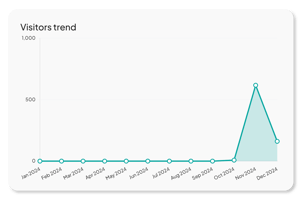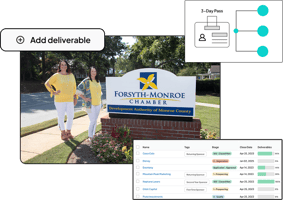Event ticketing data isn’t just about ticket sales – it’s a goldmine for executing successful...
Marketing and selling strategies to win festival sponsors
Table of Contents
 Why sponsorships are more than just funding
Why sponsorships are more than just funding- Marketing your sponsorships: creating unmissable opportunities
- The art of selling: sealing the deal with sponsors
- Integrating marketing and sales for maximum impact
Why sponsorships are more than just funding
For any festival organizer, a balanced budget is the foundation of a successful event. While ticket sales are a major revenue stream, festival sponsorships offer a critical lifeline that extends far beyond financial support. When strategically managed, sponsorships evolve from simple transactions into powerful partnerships that enhance the attendee experience, broaden your marketing reach, and boost your festival's credibility.
Think about the most memorable festivals you have attended. Chances are, a sponsor played a role in that experience, whether through a branded lounge, an interactive photo booth, or a sponsored stage. These partnerships create value for everyone involved. For attendees, they deliver unique activities and amenities. For sponsors, they provide direct access to a highly engaged target audience. And for you, the organizer, they unlock resources that make your event possible.
Understanding how to market your opportunities and then sell those partnerships effectively is a game-changer. This guide will walk you through the essential strategies for aligning your marketing and sales efforts to attract, secure, and retain high-value festival sponsorships.
Marketing your sponsorships: Creating unmissable opportunities
Before you can sell a sponsorship, you need to market the opportunity. This means packaging your festival's value in a way that is irresistible to potential partners. Your goal is to showcase not just the number of attendees, but the quality of the engagement you can offer.
Here are key strategies for marketing your festival sponsorships:
- Develop tiered sponsorship packages: One size rarely fits all. Create a variety of sponsorship tiers—such as Platinum, Gold, and Silver—that offer different levels of visibility and benefits at various price points. This allows businesses of all sizes to find a partnership that fits their budget and goals. For example, a top-tier package might include naming rights for a stage, while a lower-tier option could offer logo placement on the event website.
- Create a professional sponsorship deck: Your sponsorship deck is your primary marketing tool. It should be a visually engaging and data-rich presentation that tells a compelling story about your festival. Be sure to include:
- Audience demographics: Who attends your festival? Provide detailed data on their age, interests, location, and purchasing habits.
- Past success and reach: Share key metrics from previous years, such as attendance numbers, social media engagement, and press mentions.
- Clear benefit outlines: For each sponsorship tier, clearly list what the sponsor will receive. Go beyond "logo on a banner" and think about unique activation opportunities.
- Highlight unique activation ideas: Help potential sponsors visualize their brand at your festival. Suggest creative ways they can interact with attendees. This could be a branded charging station for a tech company, a product sampling tent for a food and beverage brand, or an interactive art installation for a creative agency. These ideas show you’re thinking like a partner, not just a seller.
- Leverage your digital channels: Use your event website, social media profiles, and email newsletters to promote sponsorship opportunities. Create a dedicated "Partner With Us" page on your website that features your sponsorship deck and a clear call to action. Announcing past successful partnerships can also create a sense of demand.
The art of selling: sealing the deal with sponsors
Once your marketing has captured a potential sponsor's interest, the sales process begins. This is where you build relationships, address specific business needs, and demonstrate the tangible value of a partnership. Effective sponsorship sales are less about a hard pitch and more about collaborative problem-solving.
Use these tips to refine your sales approach:
- Do your homework: Research potential sponsors before you reach out. Understand their brand, their target audience, and their recent marketing campaigns. This allows you to tailor your pitch to their specific needs. For instance, if a brand is focused on sustainability, you can highlight your festival's green initiatives.
- Focus on building relationships: People do business with people they like and trust. Instead of starting with a cold sales pitch, try to build a genuine connection. Attend industry networking events, connect on LinkedIn, and engage with their content. When you do make contact, frame the conversation around how you can help them achieve their goals.
- Showcase sponsorship ROI: The most common question you’ll hear is, "What's the return on investment?" Be prepared to answer it with data. Sponsorship ROI isn't just about direct sales. It also includes:
- Brand awareness: Estimate the number of impressions their brand will receive through your marketing channels and on-site visibility.
- Lead generation: Explain how on-site activations can help them collect leads.
- Media value: Quantify the value of their brand being mentioned in press coverage of your festival.
- Be flexible and willing to customize: While your tiered packages are a great starting point, be open to creating a custom package that meets a sponsor's unique objectives. This flexibility shows you are committed to a true partnership and can significantly increase your chances of closing the deal.
Integrating marketing and sales for maximum impact
The most successful sponsorship programs are those where marketing and sales work in harmony. Your marketing efforts create the demand and generate the leads, while your sales team nurtures those leads into lasting partnerships. This synergy ensures that your messaging is consistent and that you are approaching the right sponsors with the right offer.
By creating compelling marketing materials and taking a relationship-focused sales approach, you can turn sponsorships into a cornerstone of your festival's success. These partnerships provide the financial stability to grow your event and enrich the experience for everyone, ensuring your festival thrives for years to come.




